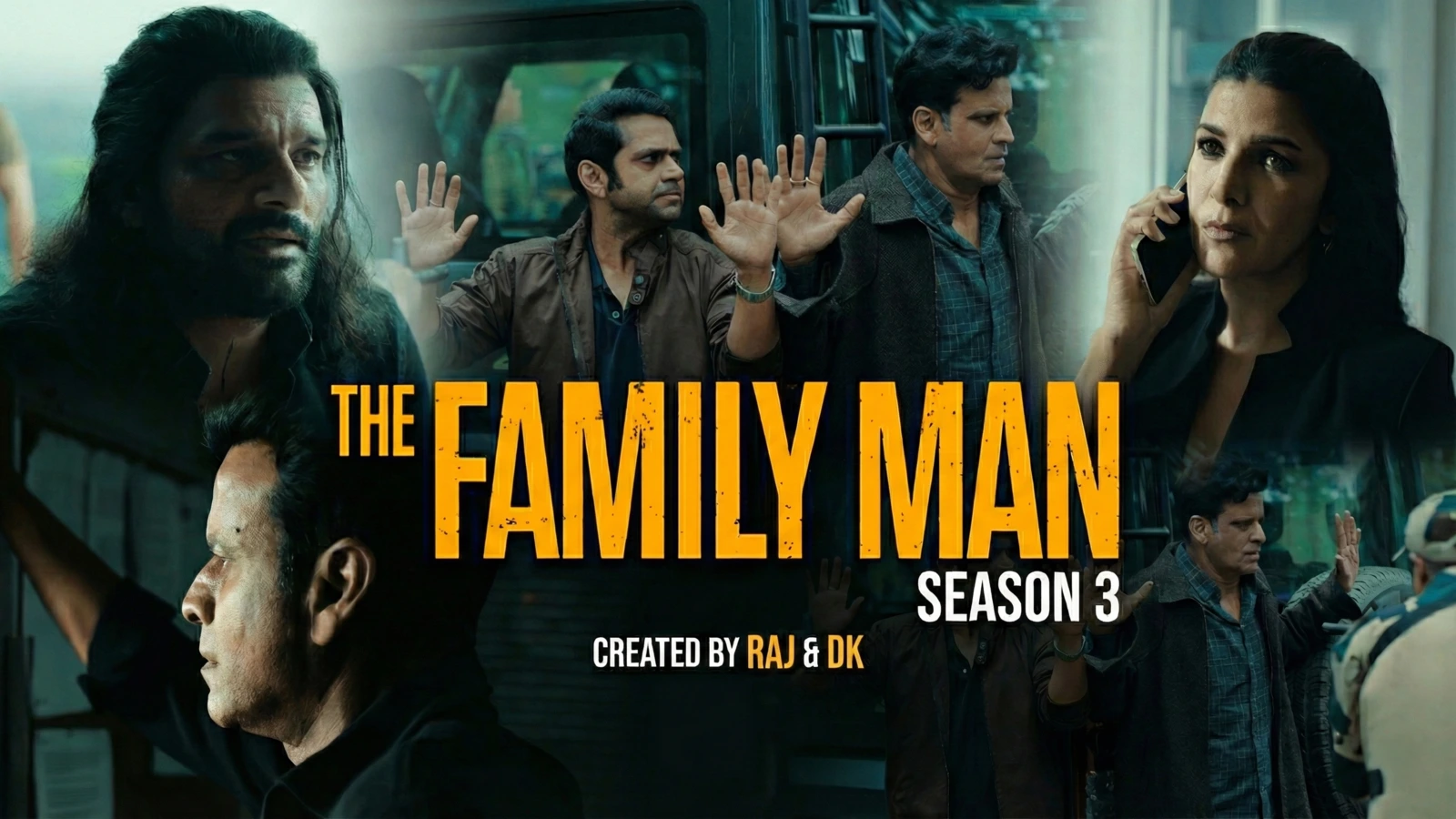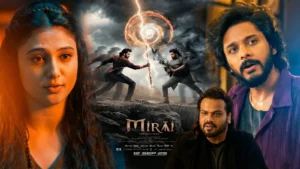The Family Man has always explored the duality of a seemingly ordinary middle-class father who also happens to be one of India’s most valuable intelligence assets. With The Family Man Season 3, released today on Amazon Prime Video at midnight, the show returns with seven tightly paced episodes that once again place Srikant Tiwari at the intersection of family conflict and national catastrophe. The anticipation for this season was enormous, especially after the way Season 2 ended – teasing geopolitical tensions, a looming crisis in the Northeast, and a pandemic-era backdrop. And in many ways, Season 3 expands its scale, ambition, and dramatic stakes. But it also takes a noticeably more serious direction, significantly reducing the eccentric humor that once defined the show.
The experience of watching this season becomes part of the narrative itself. Many viewers, like me, stayed awake through the night to binge all seven episodes, drawn into a world of conspiracies, betrayals, and emotional turmoil. There is a certain chaos and restlessness built into this world, and Season 3 reflects that energy from the very first episode. Even when fatigue sets in after a sleepless night, the show’s pacing ensures that the viewer remains engaged, largely because the story moves briskly between personal stakes and geopolitical complexities.

A Franchise Rooted in Dual Lives
At its core, The Family Man was always about the tension between an underpaid intelligence employee and his domestic responsibilities. Unlike the hyper-stylized intelligence officers usually seen in mainstream cinema, Srikant Tiwari is not a roaring figure with a codename like Tiger – he is a weary, middle-class father enduring traffic jams, negotiating grocery bills, and handling teenage tantrums while simultaneously managing threats that could destabilize the nation. This contrast is the beating heart of the show, and Season 3 leans even more deeply into this duality.
In Season 1, the contrast between duty and family life was sharply defined. By Season 2, these worlds began to collide. But Season 3 makes the overlap unavoidable. Srikant can no longer shield his family from his professional dangers. Fingers of suspicion are pointed directly at him, and the consequences of his choices spill into the personal lives of those around him. The Tiwari family, in many ways, becomes fugitives of circumstance rather than mere bystanders.

This time, the writing treats both spheres – home and homeland – with equal urgency. Srikant’s inability to keep secrets becomes a major narrative thrust, intensifying both guilt and responsibility. Season 3’s most compelling feature is this unavoidable entanglement between personal grief and national security.
- A Franchise Rooted in Dual Lives
- The Story: A Complex Web of Threats, Power, and Personal Downfall
- A Season Driven by Emotional and Narrative Intensity
- Jaideep Ahlawat – A Powerful and Refreshing Antagonist
- Logical Gaps and Creative Liberties
- A Noticeable Shift in Tone: From Humorous to Primarily Serious
- An Unexpected Cameo That Teases a Larger Universe
- Performances: Strong, Consistent, and Emotionally Grounded
- Raj & DK’s Direction – Stylish, Grounded, and Intense
- A Solid Season, But Not a Masterpiece
- Final Verdict
- Related Movie Reviews
- Rate this movie
The Story: A Complex Web of Threats, Power, and Personal Downfall
The season begins with an incident in Episode 1 that sets off a chain reaction propelling Srikant into deeper conflict. Without entering spoiler territory, this event becomes the catalyst for a plotline involving a high-profile businessman, India’s Prime Minister, Srikant’s family, and a formidable new antagonist played by Jaideep Ahlawat. Parallel to this, tensions brew in Nagaland, where insurgent movements and political maneuvering create a volatile environment.
As expected of Raj & DK’s storytelling, multiple narrative threads run concurrently. International conspiracies, personal grudges, covert operations, and emotional breakdowns all intersect at key moments. This approach heightens the sense of unpredictability but also creates narrative density that demands careful attention.
At certain points, however, the storytelling overreaches. There are episodes where plotlines temporarily disappear, only to resurface later without strong connective logic. A personal enmity that was central to Srikant’s arc in one episode is surprisingly set aside for almost two more episodes, creating an odd sense of disconnect. The show attempts to balance too many moving parts at once, and while this scope is ambitious, it occasionally compromises narrative clarity.
Despite these gaps, the overarching political narrative remains compelling, especially the way local uprisings, political ambitions, and international alliances converge to form a large-scale threat. The Northeastern setting introduces new cultural and political layers that expand the show’s geographical canvas. And although certain creative liberties stretch plausibility, the stakes remain consistently high.

A Season Driven by Emotional and Narrative Intensity
The emotional arc in Season 3 is darker and more serious than previous seasons. Srikant is written at perhaps the lowest point in his life so far – emotionally cornered, professionally isolated, and surrounded by enemies in every direction. Trust becomes a fragile commodity. Characters switch loyalties, motives blur, and deception operates in shadows.
Twists, which have been signature elements in The Family Man, feel more predictable this time. The writing foreshadows betrayals in a way that sharp viewers may identify early on, reducing the suspenseful impact. The misdirection that worked beautifully in earlier seasons is comparatively weaker, primarily because the series overtly hints at the direction it’s heading.
However, the emotional tension compensates for the predictability. The relationships between characters feel more lived in – more bruised, more complex. Even the antagonist’s emotional layers add depth, reminding viewers that villains are not mere caricatures but products of circumstances and convictions.
Jaideep Ahlawat – A Powerful and Refreshing Antagonist
One of the most striking elements of Season 3 is the introduction of Jaideep Ahlawat as the chief antagonist. His character is not a stereotypical villain organizing grand conspiracies from dark rooms. Instead, he mirrors Srikant in many human ways – a family man on the opposite side of morality. This parallel is a thoughtful narrative stroke. It gives the conflict a personal resonance and grounds the tension in character rather than spectacle.
Ahlawat delivers a performance that is both menacing and restrained. His nonchalant demeanor masks a terrifying competence. His physical presence, intense gaze, and understated cruelty make him a fascinating addition to the show’s universe. In emotional scenes, he becomes unexpectedly magnetic; in violent scenes, he becomes unpredictably ferocious. The writers have designed him as a counterweight to Srikant – a man with commitment and emotional stakes, just aligned to a different cause.

Logical Gaps and Creative Liberties
The reliance on multiple subplots sometimes results in inconsistent logic. Examples include characters abruptly shifting motivations, operational decisions that contradict earlier intelligence strategies, or romantic undertones that feel unnecessary in moments of crisis. Certain sequences – like a character traveling to Myanmar without sufficient narrative justification, or another character unnecessarily exposing himself in a shooter’s position – invite questions that the script never fully answers.
While these issues do not derail the narrative, they add a layer of frustration, especially for viewers expecting tight, intricate storytelling.
A Noticeable Shift in Tone: From Humorous to Primarily Serious
The show’s humor was one of its most beloved characteristics. Season 1’s traffic jam frustrations, Season 2’s sarcastic workplace exchanges, and the iconic slap-the-boss moments created memorable, meme-worthy scenes. These touches grounded the show in everyday reality even while the plot expanded into political conspiracies.
Season 3, however, significantly reduces this humor. Apart from a single standout moment in which Srikant sarcastically quips about saving the world with an incompetent team, the season leans almost entirely into seriousness. This tonal shift may disappoint fans who adored the unexpected comedic timing that once distinguished the show. The dryness of humor this season is noticeable and intentional, but it removes a layer of personality that previously made the series unique.

An Unexpected Cameo That Teases a Larger Universe
One of the show’s major talking points is the surprising cameo that hints at the possibility of a larger Raj & DK universe. The banter in this cameo, full of playful hostility and unfiltered dialogue, is one of the season’s rare light-hearted highs. This interaction suggests that the creators may be envisioning an interconnected OTT universe, opening the door to cross-series collaborations.
The cameo integrates smoothly into the narrative without overshadowing the main plot, but it leaves viewers excited for potential spin-offs and crossovers.
Performances: Strong, Consistent, and Emotionally Grounded
Manoj Bajpayee remains the backbone of the show. His performance balances restraint, emotional vulnerability, and dry humor with remarkable finesse. Even when scenes are written without comedic undertones, his expressions and timing add subtle relief. He does not perform like a stereotypical spy, yet every gesture reflects years of internalized experience, guilt, and pressure.
The supporting cast, including returning characters, delivers reliable performances. Priyamani once again grounds the domestic arc. Sharib Hashmi – despite limited screen time compared to earlier seasons – continues to deliver meaningful presence. The ensemble in the Northeastern track is authentic and effective, elevating regional representation.

Raj & DK’s Direction – Stylish, Grounded, and Intense
Raj & DK maintain their signature filmmaking style with:
- Long takes that build immersive tension
- Compact but gripping chase sequences
- Multi-layered action designed with realism, avoiding unnecessary flamboyance
- A grounded visual tone that mirrors India’s socio-political complexity
Season 3 may not be experimental, but it is unmistakably consistent with the visual identity of The Family Man universe. The direction prioritizes emotional stakes over blockbuster-style spectacle, ensuring that the intensity remains character-driven.
A Solid Season, But Not a Masterpiece
Ultimately, The Family Man Season 3 is a strong addition to the franchise, though not a groundbreaking one. It retains the intelligence, grounded storytelling, and emotional resonance that defined the series, but it sacrifices some unpredictability and humor along the way. The twists are milder, the comedic charm is toned down, and the narrative complexity occasionally reduces coherence.
Yet, despite these shortcomings, the season offers enough momentum, dramatic weight, and character depth to justify a wholehearted recommendation. The stakes feel real, the performances are powerful, and the political narrative remains gripping.

For viewers seeking a tightly paced, emotionally intense thriller, this season delivers. For those expecting the humorous unpredictability of earlier seasons, the absence will be felt. The season crosses into the “go for it” category – not extraordinary, but certainly compelling and worth the midnight binge.
Final Verdict
The Family Man Season 3 is a well-crafted, performance-driven political thriller that expands the franchise’s scope while grounding itself in human emotion. Its narrative ambition is commendable, its antagonist is exceptional, and its emotional core remains strong. While not perfect, it is undeniably engaging and deserves a confident recommendation.











